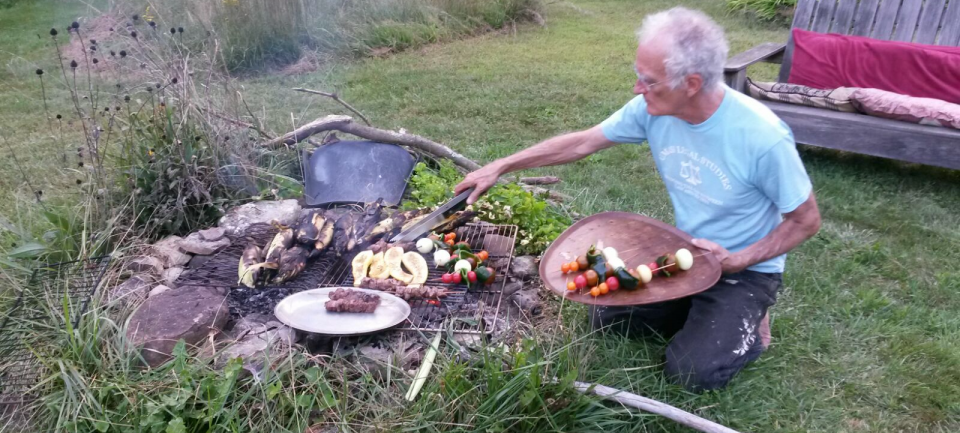In August 2019, Siobhan Leddy wrote a thoughtful little essay, “We should all be reading more Ursula Le Guin.” She said, “Her novels imagine other worlds, but her theory of fiction can help us better live in this one.” Here’s a quote:
“The Carrier Bag Theory of Fiction,” an essay Le Guin wrote in 1986, disputes the idea that the spear was the earliest human tool, proposing that it was actually the receptacle. Questioning the spear’s phallic, murderous logic, instead Le Guin tells the story of the carrier bag, the sling, the shell, or the gourd. In this empty vessel, early humans could carry more than can be held in the hand and, therefore, gather food for later. Anyone who consistently forgets to bring their tote bag to the supermarket knows how significant this is. And besides, Le Guin writes, the idea that the spear came before the vessel doesn’t even make sense. “Sixty-five to eighty percent of what human beings ate in those regions in Paleolithic, Neolithic, and prehistoric times was gathered; only in the extreme Arctic was meat the staple food.” Not only is the carrier bag theory plausible, it also does meaningful ideological work — shifting the way we look at humanity’s foundations from a narrative of domination to one of gathering, holding, and sharing.
Yes, LeGuin is an important writer! I’ve read a lot of her books and in every one found a deep understanding of life as well as a good story that teaches lessons. She seamlessly weaves anthropology and science fiction into perspectives that shed light on history, politics, economics, enlivening those staid and sometimes pompous disciplines.
But let me pick a few nits with Leddy. Well, not exactly nits, because I think they are of some significance to understanding LeGuin and her relevance to Leddy’s project.
- She uses that terrible word ’stakeholder’ to refer to members of a community:
While, in reality, most meaningful social change is the result of collective action, we aren’t very good at recounting such a diffusely distributed account. The meetings, the fundraising, the careful and drawn-out negotiations — they’re so boring! Who wants to watch a movie about a four-hour meeting between community stakeholders?
No wonder she says it’s boring: “Stakeholder” washes out the juice and truth of “collective action”. The OED ties ’stakeholder’ to money, finance, and business: “A person, company, etc., with a concern or (esp. financial) interest in ensuring the success of an organization, business, system, etc.”; “An independent person or organization with whom money is deposited, esp. when a number of people make a bet or other financial transaction.” These are not the dynamics of a community.
See Vine Deloria, God is Red, describing American towns: “Very few political subdivisions are in fact communities. They are rather transitory locations for the temporary existence of wage earners.”? ’Stakeholders’ appropriately describes residents in such places, but not in the communities imagined by LeGuin.
- Leddy gets the meaning of community here:
The carrier bag gatherer, meanwhile, is no lone genius (genius being its own kind of heroism, after all), but rather someone rooted in a shared existence.
- Leddy gets some other things spot on — ’nature’ is not our adversary (even though many natural forces challenge us); ‘domination’ is self-defeating:
We will not “beat” climate change, nor is “nature” our adversary. If the planet could be considered a container for all life, in which everything — plants, animals, humans — are all held together, then to attempt domination becomes a self-defeating act. By letting ourselves “become part of the killer story,” writes Le Guin, “we may get finished along with it.” All of which is to say: we have to abandon the old story.
But as for ‘abandoning the old story,’ I think people will only be able to do that when they see that the ‘killer story’ has abandoned them, turned on them, come to its logical conclusion. The killer story includes the reduction of ‘community’ to ‘stake-holding’; notice the examples from the OED, where the dominator actors promote ’stake holding’ as a ‘new’ story:
stakeholder economy n. originally British Politics an economy regarded or conceived of as giving all members of society a stake in its success.
1994 W. Hutton in Guardian 31 Oct. 10/5 Instead of the winner-take-all economy and polity, the aim should be a stakeholder economy and polity in which all have an interest.
1996 Daily Tel. 8 Jan. 4/1 Tony Blair will today begin to map out the main themes of Labour’s campaign pitch for the next general election. He promises to develop a ‘stakeholder economy’ in which everyone can participate.
2003 New Straits Times (Malaysia) (Nexis) 13 Mar. 12 This will encourage more participation and, consequently, move the country closer to a stakeholder economy.
P.S. You can read “The Carrier Bag Theory of Fiction” courtesy of The Anarchist Library, at https://theanarchistlibrary.org/library/ursula-k-le-guin-the-carrier-bag-theory-of-fiction.muse
